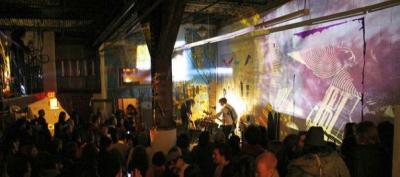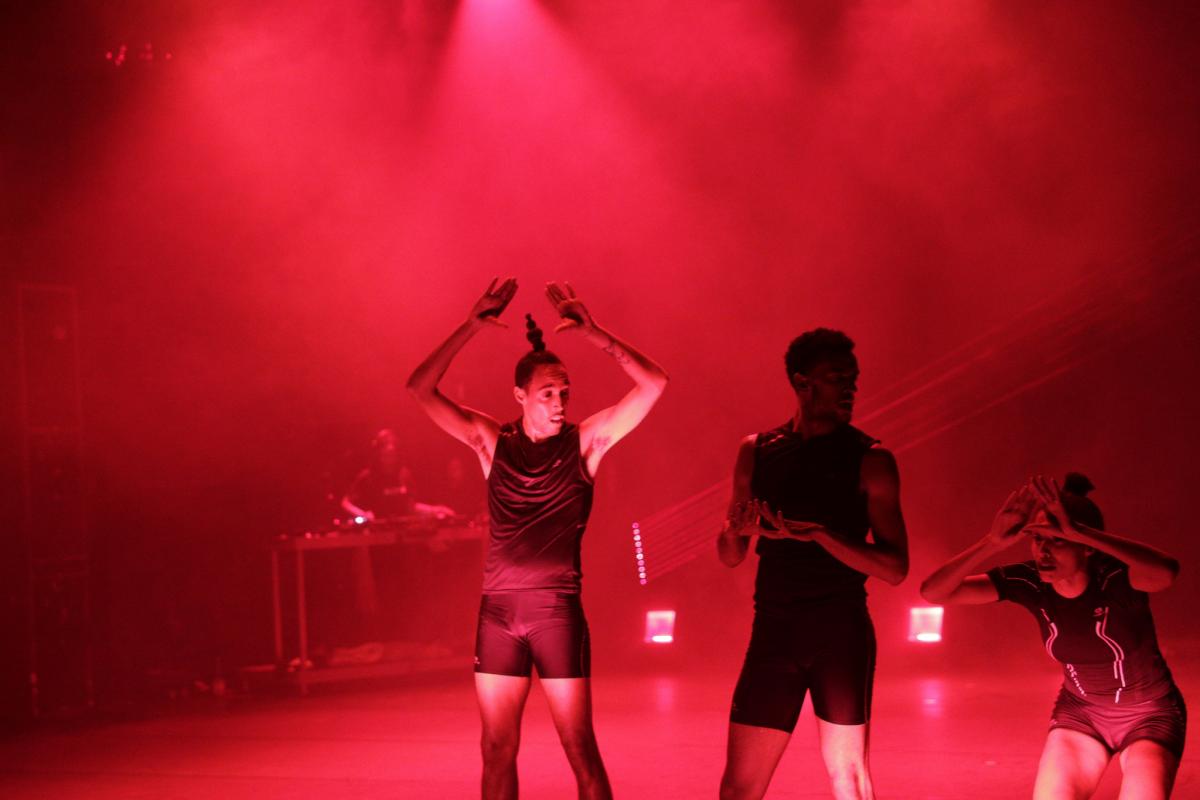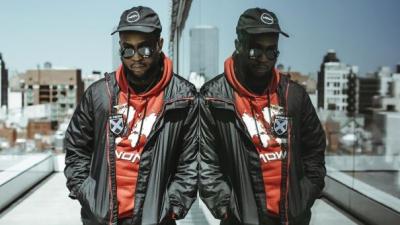
New York Gives Two Fucks
Under Trump, the US government is actively depriving artists, while the US media wants their citizens to truly listen to each other. How does the musical «underground» react to this? An essayistic report about artistic protest in New York and the comeback of «identity politics».
In the months since Donald Trump's election, the american mainstream media has urged the country to «truly listen to each other» to heal the polarized abyss illuminated by this presidency. Listening as a matter of civic duty; to talk and to listen «across the aisle» has become corollary to collective healing. But palliative for what, and for whom? What, exactly, is desired by listening? And if listening is an expression of desire, what is desired in being heard?
On February 2nd, in the wake of Trump's anti-Muslim immigration and refugee ban, thousands of Yemeni bodega owners in New York City closed their doors and occupied the plaza surrounding Brooklyn Borough Hall. With the sunset came the amplified voice of an imam singing the call to prayer, and the kneeling listeners answered in supplication. Though silent, those praying felt called, desired, and heard. They were heard in a sense not limited to the faculty of hearing, for political discourse has not yet been able to understand protest beyond quantifying attendees of the Women’s March in Washington, D.C. or offering facile visual comparisons of inauguration crowd sizes between Trump and Barack Obama.
Protest is a matter of affect: what brings you here? It is a process of interpellation on that precarious line between self, other, and collective. At a Women's March in Austin, TX, a young Vietnamese-American woman's sign proclaimed the words of Zora Neale Hurston: «If you are silent about your pain, they'll kill you and say you enjoyed it». In the white liberal bastion of Austin, her sign was treated with wary amongst those proclaiming the semantically meaningless pun, «Love Trumps Hate». That is because, she says, «It implicates somebody who doesn’t feel like that they should be implicated». Some people would «think that it belongs at a Black Lives Matter protest rather than this one».
Giving Two Fucks
In New York City, the inauguration occasioned the release of two compilations: Physically Sick, a collaboration between Discwoman and Physical Therapy's Allergy Season label with 42 tracks and Notes from Sub-Underground: A Compilation of Music, Sound, and Aural Ephemera in Protest of Inauguration Day, organized by the experimental theater group Object Collection from Brooklyn. Protest in this format is also a matter of affect: G. Douglass Barrett's «Two Fucks», track 58 on Notes from Sub-Underground, consists of two interlaid voices screaming «fuck» for 5 seconds. While the colloquial «I don't give two fucks» is an emphatic expression of apathy, Barrett literally gives two fucks – two fucks that have been exacted and extracted by anguish.
Both compilations are donation-based downloads with proceeds benefiting progressive organizations like the American Civil Liberties Union and National Immigration Law Center, yet they evince distinct collective moods. Physically Sick bills itself as medicine in the form of a «full strength protest compilation», a dosage that alleviates symptoms of «fascism, bigotry, violence, and demagoguery». rRoxymore's opening «Universal Struggle» is an anthem for a utopian Blade Runner yet to come in which no one’s humanity is questioned. The first two minutes of pulsing bass and sparse kicks create a haunted soundscape interrupted by strings announcing a yearning for a new world.
In contrast, Bill Dietz’s «Adjacency Survey (Ninefold_3i16)» that's the first track of Notes from Sub-Underground overlays an opera ballad that seems to be recorded from a warped record. Yet the scratches contain snippets of an undiscernible aural world: a dropped phone call in Cantonese, a car driving by, the rattling of a receiver. To listen to Dietz's composition is akin to finding oneself in the world of a Maya Deren film, where the uncanniness of the corporeal reigns.
The Demise of the Underground
Object Collection positions their compilation from the «sub-underground», with Kara Feely and Travis Just writing, «Subterranean networks are the lifeblood of experimental art. It is a corollary for political activity». Where, then, is the underground? In dance music, where the underground has been historically black and historically queer, it has been dramatically altered by its growth in the culture industry.
In New York City, any venue that fit any bare definition of underground as anti-commercial, like Palisades in Bushwick or the older Glasslands in Williamsburg have since been shut down. Last year, Verboten in Williamsburg was shut down by the New York State tax department for 360,000 US-Dollar in unpaid sales taxes – alongside complaints from employees and DJs for unfair labor and compensation practices.
Underground may no longer be an adequate designation, for even alternatives need resources and sustenance. Discwoman, formed in 2014 as an artist collective and booking agency allying queer, trans, and women of color, heralded a wave of DJ collectives. In political terms, by mitigating the power of booking agents, the collective is akin to an old-school labor union.

A Sampled Repetition of «Tragic»
In New York, in Standing Rock, in North Carolina, in Washington, D.C., this country is actively depriving artists – anyone with a creative investment and vision of our political future – of the resources to do the work so tenuously yet thoroughly implicated with survival. As Physical Therapy’s «This Techno Tool Track Kills Fascists» evinces, much of lived experience currently feels like a sampled repetition of «tragic».
After a September 2016 segment on a private security company's use of pepper spray and attack dogs on indigenous water protectors in North Dakota, the news show Democracy Now! played Che Christ x Indigenize’s 2016 rap collaboration «13 Arrows». The delivery is as harsh and acrid as the lyrics: «My blood the catalyst/the art of war/genetic manuscripts/pierce and move swift». Christ, recalling Immortal Technique's biting and sharp enunciation of politics, raps: «When will they ever understand/damn/still today fighting over lands/stopping these land grants». Christ is referring to the 1836 Platte Purchase, when the U.S. government offered military veterans «gifts» of land to settle Missouri and simultaneously expand to the territory where slavery was allowed.
A Baneful Liberal Contract
While the land never belonged to the federal government to give away, Native Americans had already been forcibly removed from the southeast by the «1830 Indian Removal Act» and resettled west of the Mississippi River in «exchange» for their homes. In other words, «exchange» is a wildly inappropriate word to describe the purpose and effect of these land grands. Shifting to the collective first person, Christ lays bare slavery and genocide as the historical blueprints of contemporary political struggles: «not enough money to stop all these government crimes/reservation-wide, we do this all the time/indigenize, indigenize». This is the baneful contract through which this liberal democracy was and continues to be made.
How does one resist under such conditions, as the call is made and felt at this moment? As Debra White Plume, Executive Director of Owe Aku said at Standing Rock this past summer, «the word resistance is being used, and sometimes we have a problem with the English language deciding which word to use».
Dissent is a funny word, for it describes both a state of difference and an opposing position. Dissent, gives New York senator Chuck Schumer nightmares when he goes to bed, with Michael Moore beseeching voters to «wake up, make coffee, call your congressman». Perhaps, true to Amy Goodman's hopes for Democracy Now! in 2004, dissent has become commonplace in the United States. We exist in a seemingly permanent state of difference – «identity politics» - declared the international magazine Artforum in Summer 2016, «is back». But did it ever really go away?
Biography
Links
Published on March 30, 2017
Last updated on April 10, 2024
Topics
Why New Yorks’ underground doesn’t give a fuck about Trump or why satirical rap in Pakistan can be life threatening.
Why do people in Karachi yell rather than talk and how does the sound of Dakar or Luanda affect music production?
From Muslim taqwacore to how the rave scene in Athens counters the financial crisis.
About Tunisian rappers risking their life to criticize politics and musicians affirming 21st century misery in order to push it into its dissolution.


